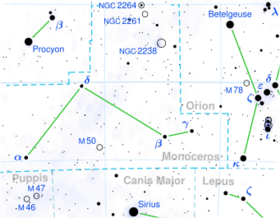Astronomy:HD 48099
From HandWiki
Short description: Binary star system in the constellation Monoceros
| Observation data Equinox J2000.0]] (ICRS) | |
|---|---|
| Constellation | Monoceros[1] |
| Right ascension | 06h 41m 59.2309s[2] |
| Declination | +06° 20′ 43.531″[2] |
| Apparent magnitude (V) | 6.37[3] |
| Characteristics | |
| Spectral type | O5.5V((f)) + O9V[4] |
| U−B color index | −0.94[3] |
| B−V color index | −0.05[3] |
| Astrometry | |
| Proper motion (μ) | RA: 0.84[2] mas/yr Dec.: 2.55[2] mas/yr |
| Parallax (π) | 1.17 ± 0.41[2] mas |
| Distance | 1829[5] pc |
| Absolute magnitude (MV) | −5.6[6] |
| Orbit[4] | |
| Period (P) | 3.0786 days |
| Semi-major axis (a) | ~33 R☉ |
| Eccentricity (e) | 0.0 |
| Inclination (i) | 16° |
| Semi-amplitude (K1) (primary) | 54.4 km/s |
| Semi-amplitude (K2) (secondary) | 96.2 km/s |
| Details[4] | |
| Mass | 55 M☉ |
| Radius | 11.6 R☉ |
| Luminosity | 450,000 L☉ |
| Surface gravity (log g) | 4.5 cgs |
| Temperature | 44,000 K |
| Rotational velocity (v sin i) | 330 km/s |
| secondary | |
| Mass | 19 M☉ |
| Radius | 6.5 R☉ |
| Luminosity | 40,000 L☉ |
| Surface gravity (log g) | 3.5 cgs |
| Temperature | 32,000 K |
| Rotational velocity (v sin i) | 185 km/s |
| Other designations | |
| Database references | |
| SIMBAD | data |
HD 48099 is a spectroscopic binary in the constellation Monoceros where both components are massive and luminous O stars.
Binary stars offer the opportunity to directly measure the mass of each component, but in the case the orbital inclination is very low and the masses cannot be accurately determined. The stars are orbiting extremely close together, separated only by about the diameters of the stars themselves. They complete one orbit in just over three days.[4]
Although HD 48099 only has a moderate space velocity of 37.7 km/s, it has produced a bow shock 2.26 parsecs from the star itself.[5]
References
- ↑ Roman, Nancy G. (1987). "Identification of a constellation from a position". Publications of the Astronomical Society of the Pacific 99 (617): 695. doi:10.1086/132034. Bibcode: 1987PASP...99..695R Constellation record for this object at VizieR.
- ↑ 2.0 2.1 2.2 2.3 2.4 Van Leeuwen, F. (2007). "Validation of the new Hipparcos reduction". Astronomy and Astrophysics 474 (2): 653–664. doi:10.1051/0004-6361:20078357. Bibcode: 2007A&A...474..653V.
- ↑ 3.0 3.1 3.2 Ducati, J. R. (2002). "VizieR Online Data Catalog: Catalogue of Stellar Photometry in Johnson's 11-color system". CDS/ADC Collection of Electronic Catalogues 2237. Bibcode: 2002yCat.2237....0D.
- ↑ 4.0 4.1 4.2 4.3 Mahy, L.; Rauw, G.; Martins, F.; Nazé, Y.; Gosset, E.; De Becker, M.; Sana, H.; Eenens, P. (2010). "A New Investigation of the Binary Hd 48099". The Astrophysical Journal 708 (2): 1537–1544. doi:10.1088/0004-637X/708/2/1537. Bibcode: 2010ApJ...708.1537M.
- ↑ 5.0 5.1 Brown, D.; Bomans, D. J. (2005). "To see or not to see a bow shock". Astronomy and Astrophysics 439 (1): 183–194. doi:10.1051/0004-6361:20041054. Bibcode: 2005A&A...439..183B.
- ↑ Hutchings, J. B. (1976). "Spectroscopic measurements of OB supergiants". Publications of the Dominion Astrophysical Observatory Victoria 14: 355. Bibcode: 1976PDAO...14..355H.
 |

